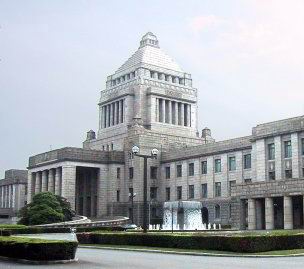Imperial Presidency: A Constitutional Manifesto
 •
by
•
by Myung Kei
Hoot.

The symbol of the Imperial House of Kokawa
It has been quite a long time since I have had a formal discussion with the now former Emperor of eJapan: Kokawayoshi Makoto. My last official state visit was back when I was an ambassador from some forsaken eAsian nation was quiet, and the discussion mainly was over the expansion of the eOwlery in the Imperial Palace and the status of the eJapanese situation. The formal Tea session was quiet, but abet as cordial as it ever was with Kokawa; I was honored to be, at the very least, a friend of the eJapanese national identity: the Emperor. However, this memory is now a relic of an old period, an era which has seen it's sun set. Since then, eJapan as a country has changed dramatically, and it is almost unrecognizable in all possible scopes. There are still a few of the older players lurking around (Akki, I'm staring at you), but cutting the nostaliga:
The Reji Constitution (Old Constitution) has been declared null, and progress is underway over the discussion of a new constitution to reflect the new era that eJapan is entering. Several questions have been raise😛
What will it look like? Will the drafters live up the likes of the original creator(s)? How specific and defined will it be?
The question I believe that is more important, is "How different will it be from the past, and other eConstitutions?". If we want to have something that is truly unique, we may have to introduce new RP elements to encourage activity, perhaps, it may need to redefine our whole belief in eGovernment as we know it.

The Diet of Japan (Congress)
Before Kokawa's death, he made one final attempt to run for president. The Old Constitution clearly barred the Emperor from engaging in politics, but Kokawa wanted to ignore constitutional limitations and make one last attempt to encourage activity in what he saw was a declining country. In his manifesto, he proposed something radically different than any other government in eRepublik. Kokawa drew up the plans for, in essence a parliamentary monarchy.
The main difference between a parliamentary and presidential system (the latter being what we have now, and what eRepublik has always had) is where the ultimate power rests.
In a presidential system, it is, as the name suggests: in the president. In eRepublik the president has both in-game duties such as clicking buttons and proposing treaties, and out of game duties such as appointing running a cabinet. Congress has a weaker oversight, and in most cases it's only options are complaining (a.k.a. nothing), and impeachment (a nuclear, last resort, "we are all gonna die!" option). The presidency is, as a result, very nimble and insulated from quick changing opinion, but also very political and polarizing.
In a parliamentary system, the parliament is where the ultimate power rests, and the main executive is either a figurehead or a simple functionary. Theoretically for eRepublik, this would mean that the president is stripped of all of his out of game powers (cabinet) and it is instead transferred to a government selected by the parliament (aka the Imperial Diet, aka Congress). The hypothetical result being that the Emperor is more than a simple powerless ceremonial figure, but is removed from all of the controversial political power that comes with a button presser. All of the party/political stuff would shift to where it naturally occurs anyway: the Congress of the country. This is of course, venturing into the unknown because this has not been attempted anywhere else; mostly because the term "president" evokes images of presidential government, and close to never have presidents been wiling to give up power voluntarily.
This simple transformation would represent quite the break from traditional eRepublik governance. Is an "Imperial Presidency" what eJapan needs? I do not know. What is clear though, is that this Constitutional debate can and should encompass everything: even areas once thought untouchable.
(If there is enough interest, I would be willing to make this a series with two further articles, one that would define the Imperial 'executive' and one that would go over the powers of the Imperial 'parliament)


Comments
I miss HIM Kokawayoshi Makoto
Ten Thousand Years!
The issue would be.. Who should write the new constitution. As eJP is divided into 2 groups basicly, we'd need someone who is respected by both sides and is lesser biased. Which more or less doesn't seem to exist in this country.
I love chaos and anarchy. So no regrets here. But Kokawa was more then an emperor. He was a friend too.